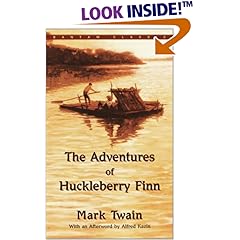This blog contains something related to Literature such as drama, novel, literary research, film
Friday, July 4, 2008
- The Adventures of Huckleberry Finn (Bantam Classics) (Mass Market Paperback) : by Mark Twain (Author)
One hundred and twenty years after its publication, The Adventures of Huckleberry Finn remains the quintessential American novel. It is an amazingly well crafted piece of work, as complex or as simple as you want it to be. On one level, it is a dissertation on society, slavery, morality and the meaning of civilization. On another, it is simply an entertaining yarn. Whether you are 8 or 88, there is something here for you.
At the heart of the novel is the unlikely but heartfelt friendship between Huck and Jim, a runaway slave. Both are outcasts of sort, running away from a society they cannot comprehend. It is through his friendship with Jim and their adventures together on the river that Huck truly finds himself. He is continually confronted with the question of right and wrong and he learns to stay true to himself and follow his own heart, regardless of conventional, social, or religious mores. Huck's instincts rarely fail him. And, as Huck suspects all along, he learns more on the river than he ever did in school or Sunday school.
Many readers see the ending (Huck's adoption and continued "civilization") as a disappointment. I disagree. Huck has grown so much that his individuality has already been forged. Aunt Sally can't change him, no matter how hard she tries to "sivilize" him. Besides, Huck always has the option of escape.
The book has been lambasted in recent years for its shocking language. But I think it is important to understand that Twain was simply being honest and faithful to the dialect, language, and social sensibility of the times. It would be unfair (and a mistake) to apply present day sensibilities and standards of political correctness (well intended or not) to this book. The language may seem harsh but it should seem harsh. There is value in that as well.
It would also be lazy to infer that Twain was racist simply because he uses the "n" word in this book and because of his characterization of Jim as simple and naive. Jim is uneducated, yes, but in Twain's world, uneducated can also mean unspoiled, completely human, noble, and honest. Rather than demeaning Jim, Twain is holding him as an example of the dignity inherent in all human beings.
The value of the individual versus the influence of society. The hope and opportunity of freedom versus the comfort and security of civilization. These are themes that have reverberated throughout American literature, American history, and the American psyche. The Adventures of Huckleberry Finn develops those themes brilliantly in a captivating story with vibrant and unforgettable characters. It is, and always will be, an American classic.
Subscribe to:
Post Comments (Atom)

No comments:
Post a Comment